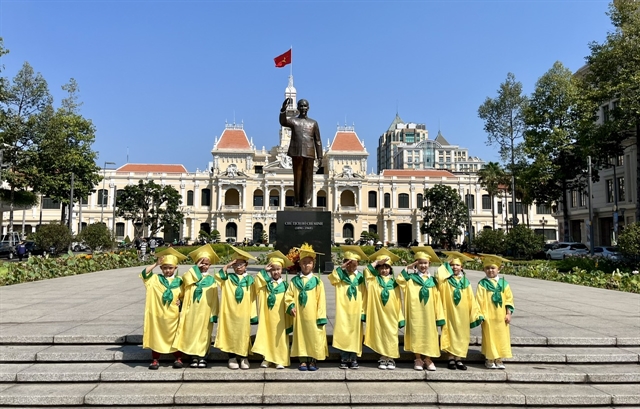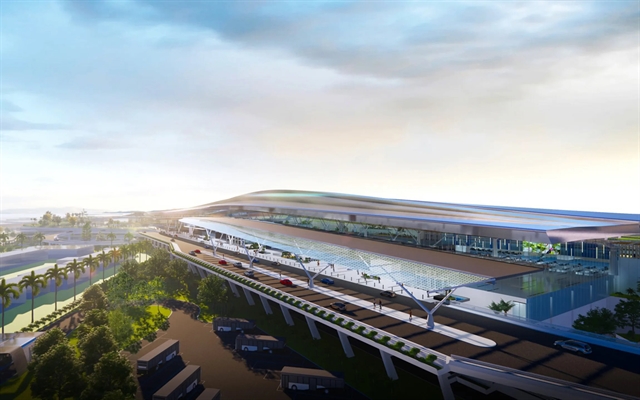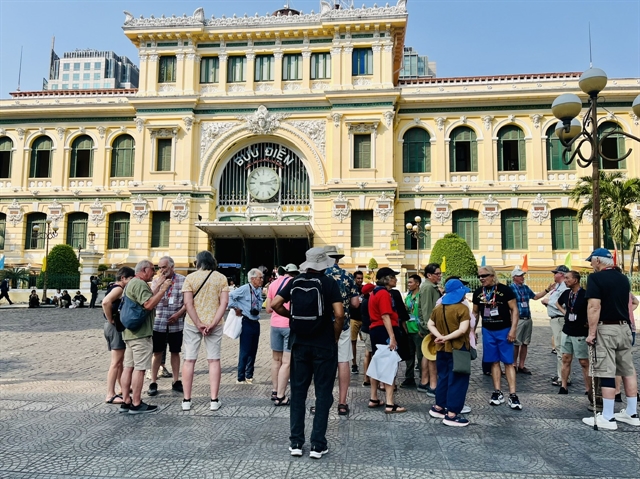Weather:
- Ha Noi 26oC
- Da Nang 27oC
- Ho Chi Minh 27oC

As Việt Nam celebrates Reunification Day, one of its most significant historical events, HCM City’s vibrant culture and rich history are on full display as people from all walks of life have come together to share their past and look towards a brighter future.
Alongside the cultural and artistic festivities marking the end of the war and the reunification of the nation, the city is ramping up efforts to achieve its ambitious socio-economic targets and to reflect upon the momentous occasion, Bồ Xuân Hiệp reports.
The streets across HCM City, formerly known as Sài Gòn, are adorned with red flags and banners symbolising the spirit of unity and patriotism that brought the country together.
The bustling metropolis rich in history and culture is commemorating one of Việt Nam’s most significant historical events - Reunification Day, April 30, 1975.
Cultural events, parades, and fireworks displays are being organised in various locations throughout the city and the nation.
One of the key events planned to honour the event was a ceremony last week to commemorate Kings Hùng, the nation’s legendary founders, featuring martial arts performances, dragon dances, and traditional art shows.
A special programme titled “Ngày Hội Non Sông Thống Nhất” (National Reunification Day) will feature a music and dance gala on April 29, including songs that praise the nation, its islands and seas, President Hồ Chí Minh, and the city itself.
A photo and art exhibition will highlight the country and the city’s progress and growth. In addition, there will be a grand fireworks display on April 30.

Nguyễn Thị Khuyên, 30, from the central province of Hà Tĩnh and works in HCM City, said the day holds special meaning for not only the city's residents but for all Vietnamese people across the nation.
“It reminds us of the sacrifices made by those who fought for the country’s freedom, independence and sovereignty,” she said.
For a brighter future

HCM City is not only reviewing its past achievements but also looking forward to a brighter future through infrastructure improvements.
According to Nguyễn Văn Nên, secretary of the HCM City Communist Party Committee, the city is particularly focused on enhancing its infrastructure to support economic recovery and growth.
One of the city’s priorities is the early completion of the new passenger terminal, Terminal 3 (T3), at Tân Sơn Nhất International Airport, which is expected to finish two months ahead of schedule, coinciding with the 50th anniversary event next year.
The terminal is designed to accommodate 20 million passengers annually and is set to double the airport’s operational capacity, reducing congestion and improving efficiency.
In addition to the T3 project, the city is also prioritising the completion of several other key traffic projects this year to accelerate public investment disbursement.
These projects include Ring Road 3, the An Phú Intersection project, upgrades to National Highway 50, the construction of a double underground tunnel beneath Nguyễn Văn Linh Boulevard, and the establishment of a new road linking Trần Quốc Hoàn and Cộng Hòa streets to Tân Sơn Nhất International Airport.
City officials have also announced the first metro line, which will run between Bến Thành Market in District 1 and Suối Tiên Theme Park in Thủ Đức City, will commence commercial operations in July.
The line is currently 97 per cent complete and has been built at a cost of over VNĐ43.7 trillion (US$1.9 billion).
Originally scheduled for completion in 2018, the project has faced multiple delays due to funding issues and the impact of the COVID pandemic, but is finally nearing its long-awaited debut.
The completion of the metro line is a significant milestone for the city’s transportation infrastructure.
The city is also expanding its public transportation network, upgrading existing bus systems, as well as improving the efficiency of waterway transportation.
It is implementing smart city technologies to enhance urban management and improve the quality of life for its residents, including implementing smart traffic management systems, digital connectivity, and smart public services.
Experts have, however, pointed out the city is also facing challenges such as low credit growth, a slow real estate market recovery, and falling foreign direct investment (FDI) attraction.
Phan Văn Mãi, chairman of the municipal People’s Committee [Government], has pledged that city authorities will seek solutions to improve economic performance in the upcoming quarters.
The city is expected to benefit from the implementation of a National Assembly-approved resolution which was issued in June last year.
The resolution includes a range of mechanisms and policies to support development in the city, covering areas such as investment management, finance, urban management, natural resources, and science-technology management.
The successful implementation of the resolution is expected to continue to back up economic recovery for not only HCM City but the entire country, experts noted.
Ambitious targets

Despite the numerous challenges facing it, the city is committed to reaching its ambitious targets for 2024 and beyond with tourism being one of the key areas.
According to Lê Trương Hiền Hòa, deputy director of the city's Department of Tourism, as a major player in the country’s tourism industry, the city has set specific targets to increase tourism revenue to over VNĐ190 billion and attract more than 6 million international visitors this year.
The city is diversifying its tourism products to improve the overall visitor experience and attract visitors at home and abroad.
The city boasts 185 historical, religious, and cultural heritage sites, including two UNESCO intangible cultural heritage sites, making it among the country’s top tourist destinations.
The city has recently introduced nearly 50 new tourism products.
It has also collaborated with local travel companies to organise new tours, such as the “Sài Gòn – Big Market Memories” tour, to provide unique insights into its rich history and cultural values.
Last year, it welcomed nearly five million foreign tourists and close to 35 million domestic tourists, generating over VNĐ160 trillion in tourism revenue.
The city has also set targets in other areas such as upgrading its IT infrastructure, ensuring adequate classroom facilities, and having a trained workforce with certificates or training qualifications.
With plans to create new jobs and open general hospitals in key districts, the city aims to improve the quality of life for its residents and foster economic growth.

HCM City's economy is expected to bounce back in the second half of the year, with projected 8 per cent growth for the year, according to the HCM City Macroeconomic Report: 2023 Results and 2024 Forecast.
The city has shown positive economic growth in the first quarter of the year, with its GRDP reaching over VNĐ406 trillion, up 6.5 per cent year-on-year.
The service sector remains the key driver of economic development, contributing nearly 72 per cent to the growth, while industry is also showing positive growth.
In terms of the state budget, the city has collected over VNĐ139 trillion, up 7.6 per cent over the previous year.
By setting ambitious targets, the city aims to ensure sustained growth and prosperity for its residents, in commemoration of the nation’s historical events.
These ambitious goals not only mark this year’s National Reunification anniversary but also anticipate the city’s grand 50th anniversary next year. VNS

